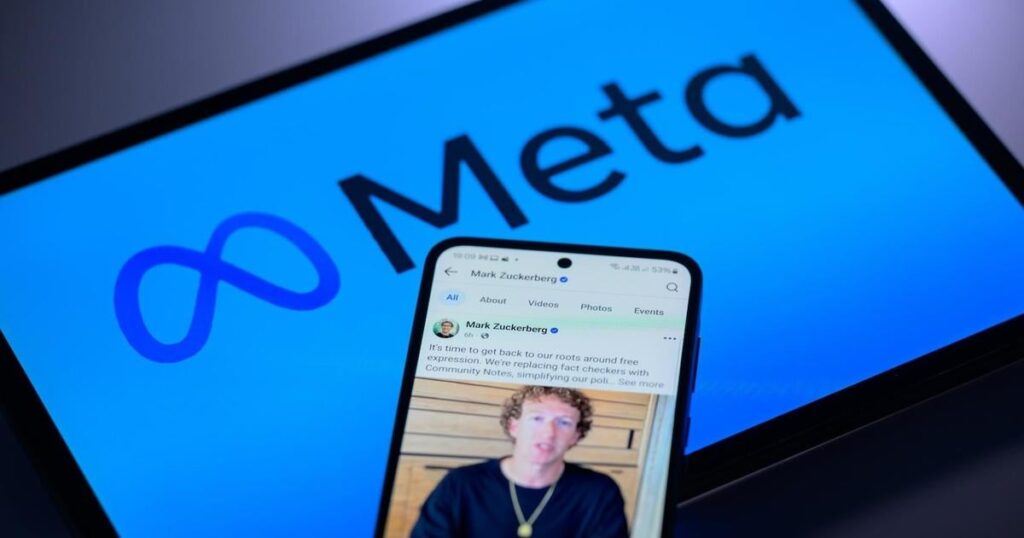Meta is denying claims circulating on social media that it forced Facebook and Instagram users to follow President Trump‘s official accounts, saying the changes some users noticed were standard practices tied to the transition of the POTUS account from the previous administration to the incoming one.
The company also said that it is working to resolve an issue on Instagram that temporarily blocked certain political terms, including “Democrats” and “Republican,” from search results.
Some Facebook and Instagram users reported on Monday that their accounts automatically followed President Trump, Vice President Vance, and first lady Melania Trump’s accounts under the @POTUS, @VicePresident, and @FLOTUS handles, respectively. Some said they never followed the accounts in the first place, and when they tried to unfollow the pages they were prevented from doing so.
Meta spokesperson Andy Stone said the company did not make people’s accounts follow the official presidential Facebook and Instagram accounts. Instead, people who had previously followed the official POTUS account saw it updated to reflect President Trump taking office.
“This is the same procedure we followed during the last presidential transition,” Stone said, adding that people may experience delays when they try to follow or unfollow “as these accounts change hands.”
Meta’s public affairs director Nkechi Nneji told CBS News, “Meta doesn’t make anyone follow any account and we never have.” Nneji said people might have forgotten that they opted to follow the official White House accounts during previous administrations.
Katie Harbath, Facebook’s former public policy director for global elections from 2011 to 2021, said her team was involved in helping establish the company’s first presidential social media transition as Obama left office in 2017.
The Trump administration followed the same protocols again in 2021 when they passed the accounts over to the Biden administration. The process allows for each incoming president to have a clean slate for their social media profiles.
“That would give them the opportunity to set up the page how they want, make sure it’s got the cover photo, all that jazz,” Harbath told CBS News. “Then it was decided that under the assumption that people are following the institution — regardless of who’s in it — that the followers would be mirrored over, copied over to the new page.”
In general, when users want to unfollow an account on Facebook, they can click the ellipsis on that profile page and press the “unfollow” or “block” button.
Additionally, some Instagram users reported being unable to see results for “Democrat” and other political words when they searched them, but that they were able to see results for “Republican.”
Stone responded to the claims on Tuesday, saying a technical issue was “affecting people’s ability to search for a number of different hashtags on the platform — not just those on the left.” Nneji told CBS News on Wednesday that technical issues with searches for political and non-political terms had mostly been resolved on the mobile app.
CBS News searched variations of “Democrat” and “Republican” on the mobile version of Instagram on Wednesday and returned millions of results.
However, on the desktop version of Instagram, the search returned no results for “Republican” and “Democrats,” but did yield results for “Republicans” and “Democrat.” Additionally, there were no results for other words, like “Constitution,” on the desktop version, but over a million results on the mobile app.
Mr. Trump’s personal Facebook and Instagram accounts were suspended following the Jan. 6, 2021, attack on the Capitol, after the company said his posts incited violence. His accounts were reactivated in 2023.
The timing of the latest issues raised concerns among some Facebook and Instagram users. Meta CEO Mark Zuckerberg attended President Trump’s inauguration on Monday, along with other tech leaders including X owner Elon Musk and Amazon executive chair Jeff Bezos.
Zuckerberg announced the end of Facebook’s third-party fact checking program on Jan. 7 because of what he said were concerns of bias and the over-enforcement of rules. The platform will instead adopt a community approach similar to X’s Community Notes.
Zuckerberg also announced the platform would start phasing in more recommendations for political content, reversing a decision made in February 2021 when Zuckerberg said he received feedback that people “don’t want politics and fighting to take over their experience.”
Joel Kaplan, Meta’s chief global affairs officer, said in a statement on Meta’s website that the shift was “an attempt to return to the commitment to free expression.”
“That means being vigilant about the impact our policies and systems are having on people’s ability to make their voices heard, and having the humility to change our approach when we know we’re getting things wrong,” Kaplan said.
Corynne McSherry, legal director for the Electronic Frontier Foundation, a nonprofit digital rights organization, told CBS News social platforms are not transparent enough about how their platforms work for users.
“That’s just a real fundamental problem,” McSherry said. “The problem though [that is] happening does reflect a lot of confusion and difficulty from the user perspective to really understand how to even to, you know, set [and] arrange their settings, so they’re not getting content that they don’t want. And I think all of the platforms have a very long way to go.”
